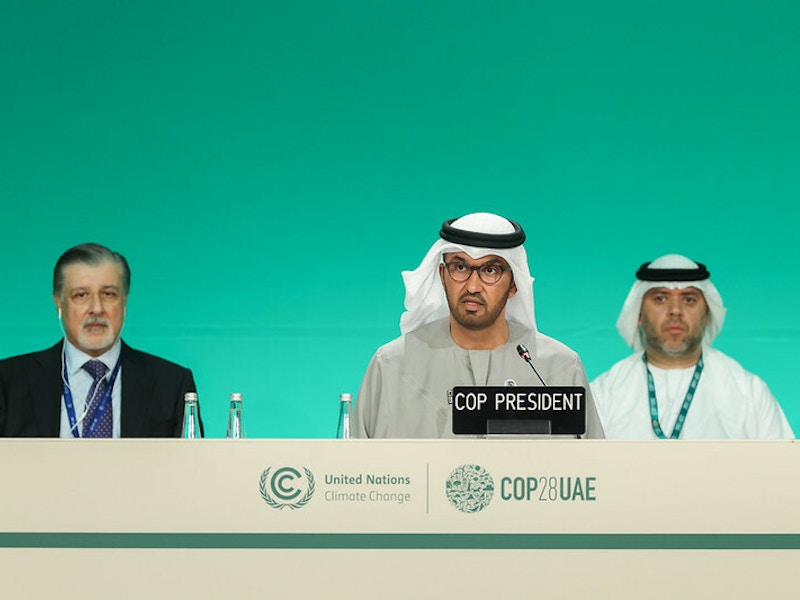
COP28:
Glimmer of hope for rainforests amidst vague phase-out of fossil fuels
Countries commit to tripling renewable energy and doubling energy efficiency by 2030 in the hope that this will replace oil, coal, and gas. COP28 also emphasizes the importance of increased efforts to halting deforestation by 2030.
CLOSING PLENARY: H.E. Dr. Sultan Al Jaber, COP28 President speaks during the Closing Plenary at the UN Climate Change Conference COP28 at Expo City Dubai on December 13, 2023, in Dubai, United Arab Emirates. Photo: COP28 /Christopher Pike
Oslo/Dubai, 13 December 2023
In the final hours of COP28 in Dubai, the countries agreed for the first time to highlight important measures to solve the climate crisis.
These include a tripling of renewable energy and doubling of energy efficiency to replace oil, coal and gas and a halt to deforestation by 2030. However, they did not reach an agreement to phase out fossil fuels.
"Not increasing climate action is a disaster for the world's rainforests
and the people living in and of it. They are highly vulnerable to
climate change, as evident in the Amazon now, with rivers drying up and
species at the brink of extinction. The Amazon is edging towards a
tipping point. If the world's rainforests are destroyed, limiting global
warming to below 1.5 degrees would be a pipe dream," said Toerris Jaeger, executive director of Rainforest Foundation Norway.

"The agreement offers a glimmer of hope with the ambition to halt deforestation, but slow progress on fossil fuels is a threat to the rainforest."
Toerris Jaeger, executive director of Rainforest Foundation Norway.
Reinforcing positive rainforest results
The agreement from Dubai reinforces the positive development seen in reducing deforestation of the world's rainforests. Brazil has halved deforestation so far this year, Colombia has reduced deforestation by 70 %, and Indonesia by 75 %. Norway and several other countries are also contributing with increased financial support to these efforts.
"Less destruction of rainforests is the most important news of the year for climate and nature. In Brazil alone, so far this year the reduced emissions are equivalent to more than half of UKs emissions in 2022," Jaeger said.

AREAL: Aerial view of Dragao lake, located in the Morro dos Seis Lagos area in the municipality of Sao Gabriel da Cachoeira in the Brazilian Amazon. Photo: Lalo de Almeida/ Folhapress
Sends a message to national nature plans
For the first time, a UN negotiation decision was made on enhanced efforts to halt deforestation by 2030. This is a crucial message as all countries shall deliver their plans for the protection of nature over the next year as part of the Global Biodiversity Framework.
To deliver on this, rainforest countries must commit to zero deforestation, wealthy countries must commit to further increases of biodiversity finance, and the private sector must remove all deforestation from their activities and supply chains.
"Rainforest countries, developed countries and the private sector should read this as a clear call to action. They all need to step up efforts to achieve this, including delivering a plan for zero deforestation to the Global Biodiversity Framework next year," said Toerris Jaeger, executive director of Rainforest Foundation Norway.

Anders Haug Larsen
Advocacy Director
(+47) 932 17 626
andershl@rainforest.no